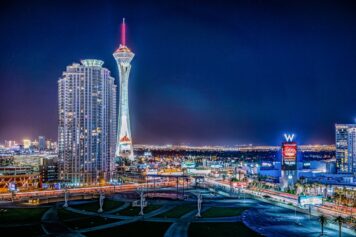More Black Americans are ditching the United States for a better quality of life abroad. Black people are not a monolith, so the reasons vary. One overarching theme for many Black Americans choosing to build a life overseas, however, is that they’re tired of racism and discrimination in their home country.
While Black folks have been doing this for the last few decades –– such as W.E.B. DuBois, James Baldwin, and Josephine Baker, the Blaxit movement was hard to miss in 2016. Taking a play on words from the name Brexit, which was given to the United Kingdom’s decision to depart from the European Union, Blaxit refers to Black people leaving the United States to start life in another country. When leaders in Ghana announced the “Year of the Return” campaign for 2019, inviting African descendants to “come back” home and reconnect with their roots during what marked 400 years since the first enslaved Africans arrived in America, it inspired more Black Americans to reconsider life in places such as Ghana.
The deaths of George Floyd, Ahmaud Arbery, and Breonna Taylor energized Black Americans even more to leave in 2020. Tired of racism and in an attempt to save their life and the lives of their children, more Black Americans moved to places such as Mexico, Costa Rica, Portugal, Ghana, Senegal, and Panama –– to name a few.
Months before Floyd’s and Taylor’s death, a 2019 report by the National Academy of Sciences found Black men were 2.5 times more likely than white men to be killed by police.
Beyond racism, affordability plays a major role in Black Americans’ decision to move abroad.

The average cost of a home in the United States is $417,700, according to the most recent Federal Reserve data for January 2024. That’s nearly double the average cost when looking at the data from Q1 just ten years ago when the average home cost Americans $275,200 in 2014.
As prices in the volatile market continue to soar, Black Americans continue to face discrimination from banks for mortgages. A damning analysis from CNN found that Navy Federal –– the largest credit in the U.S. rejected more than half of its Black conventional mortgage applicants despite having better credit scores and more income than their white counterparts.
With more Black Americans considering a move overseas, various social media groups provide resources and advice for singles, couples, and families. The Facebook Group Blaxit Tribe — Black Americans Who Want to Exit the US & Move Abroad has more than 37,000 members. The group focuses on factors people should consider before choosing a home, how to find housing, work opportunities, and more.
Other resources are found on YouTube where people are documenting their moves abroad, especially when it comes to affordability.
Maame Amoaa Boateng-Kagyah is a Ghanaian-based real estate agent who posts videos on her YouTube channel highlighting the various homes people can buy in Ghana within their price range and showing what others who have moved from countries like the U.S. have purchased.
In a recent episode, she took people on a tour of Karen King’s home. She moved from Raleigh, North Carolina, and built a four-story house in Asebu, Ghana, for approximately $70,000.
The mother of four, grandmother, and great-grandmother of nearly two dozen explains that she moved for spiritual reasons after her first visit to Ghana.
“Each day, I just began to feel more and more of the stress of the West leaving me,” King tells Amoaa. “I was feeling more and more grounded.”
After spending two weeks in Ghana, King says she started discussing building a home. She built a four-bedroom house with four and a half bathrooms after receiving land from Ghana as a part of its “Year of Return” campaign. The campaign invited descendants of enslaved Africans to “come home” by reconnecting with the land of their ancestors. Ghana’s government also worked with local chiefs to gift more than 500 acres of land to people who want to return and invest in Ghana.
King did just that, building a home with space for her family and even offering a room on Airbnb.
Her decision resonated with viewers, who are also considering relocating for affordability.
“My husband is from Croatia, and we’re seriously considering moving back there to retire because it’s just become too costly to live in the U.S. I’m glad this idea is working out for other retirees,” one person commented.
“The fact that this amazingly beautiful home is around $70K USD is wild to me! I live in Washington, D.C., and we can’t get a sturdy cardboard box for less than $400K,” said another.
“Great video! Gorgeous and brave, Karen! A house like this in America would be half a million dollars in the Washington, D.C., and Maryland areas where I live,” said another. You’ll be paying for it for over 30 years with your blood, sweat, and tears!”
In another video, Amoaa shows the three-bedroom container home Calvin Daniels built for $33,000 in Ghana on 38 acres of land.
A Thin Line Between Finding A New Home and Colonizing
Moving abroad comes with its challenges. Costs can be a barrier. A couple posted in the subreddit r/antiwork that they’ve spent more than $25,000 on legal fees, rental agent fees, flights, and accommodations. For people who become digital nomads first before filing for permanent residency, many countries require you to prove that you can support yourself for a remote work visa.
Brazil requires you to make at least $1,500 monthly or $17,000 in your bank account. In Belize, single people must make at least $75,000 per year, and couples applying together must make $100,000 each year.
In addition to financial barriers, there’s a possibility of a cultural clash between locals and visitors and the concern that visitors are driving up locals’ living costs.
An NPR podcast episode touches on this topic, exploring how Black Americans moving abroad can hurt locals by driving up costs.
It’s important that Black Americans move abroad with care. Some of the best ways to move abroad are to relocate to less popular places to avoid displacing residents from their homes in larger cities where rent prices tend to be higher.
It’s also best to support local businesses, hire locals, and pay them a living wage as costs continue to increase.


